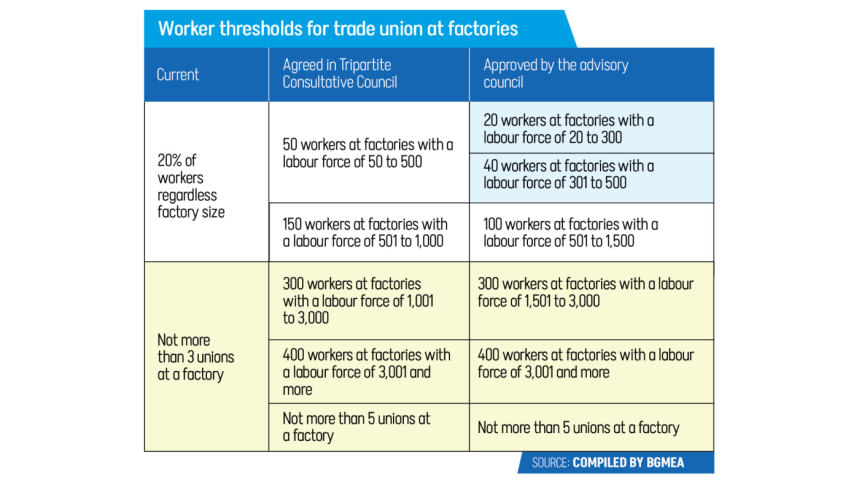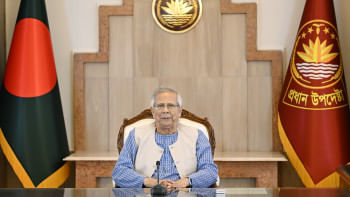Labour law changes ignite union row

- Advisory council lowers thresholds for unionisation
- Employers warn of unrest, economic risks
- Labour leaders urge consultation, gradual reform
- Draft ordinance proceeds to presidential approval
The advisory council's approval of the Bangladesh Labour Act (Amendment) Ordinance 2025 last month caught both factory owners and labour representatives by surprise.
Because the approved draft on forming trade unions differs from what was agreed in earlier meetings among employers, unions and government officials, according to industry leaders.
They say the new thresholds for union registration are far easier than the current level and way lower than the consensus reached at the Tripartite Consultative Council (TCC).
Employers, especially the Bangladesh Garment Manufacturers and Exporters Association (BGMEA), said the changes could lead to confusion and unrest at factories instead of protecting the rights of workers.
During the TCC meetings, the highest forum for labour law decisions, the existing 20 percent threshold for union registration was dropped in favour of a multi-tier system. At factories employing 50-500 workers, it was agreed that a trade union could be formed if at least 50 workers gave their consent.
For factories with 501 to 1,000 workers, it will require the consent of 150 workers.
The meetings also agreed that in factories employing 1,001 to 3,000 workers, 300 workers' consent would be necessary, and in units with more than 3,000 employees, 400 workers could apply for a union. Regardless of size, up to five unions could be formed in a single factory.
But the advisory council lowered these figures, reducing the thresholds significantly. The draft allows just 20 workers to form a trade union at a factory employing between 20 and 300 workers.
According to the draft, 40 workers' consent will be needed where 301 to 500 are employed, 100 workers' consent for factories with 501 to 1,500 employees, 300 for 1,501 to 3,000 workers, and 400 for factories with more than 3,000 workers.
The advisory council will now forward the draft to the law ministry for vetting. After review, it will go to the President's office for approval and be issued as an ordinance, since parliament is currently not in session.
Bangladesh has been updating its labour law amid pressure from international bodies such as the International Labour Organisation (ILO), the European Union and the United States to align with global standards. Stronger labour rights are seen as crucial for improving the country's trade competitiveness, attracting foreign investment, regaining GSP facilities, and signing new trade deals.
Still, garment manufacturers say that the lowered thresholds could backfire.
They fear the emergence of external groups influencing union formation, potentially leading to "chaos, confusion and conflict" across factories.
"Primarily, we want the government to adopt the decision that was taken at the TCC meetings as the decision was taken in consultation with all stakeholders," said Mohammad Hatem, president of the Bangladesh Knitwear Manufacturers and Exporters Association (BKMEA).
"And if the TCC meetings' decisions cannot be finally approved, the current 20 percent or lower threshold of workers is also good for us," he added.
Under the existing law, 20 percent of workers' consent is required to form a union.
During the TCC discussions, factory owners agreed to reduce it to 15 percent under international pressure, while union leaders pushed for 10 percent. The council, comprising 20 representatives each from workers, employers and the government, debated between the two figures.
"If the government adopted a middle point of 10 percent and 15 percent at a 12.5 percent threshold, it could have been better," said Hatem. "And we expected a 12.5 percent workers' threshold from the government. We have given a note of dissent as the TCC decision was bypassed."
He cited the cases of Adamjee Jute Mills and Laxminarayan Jute Mills, which he said were damaged by excessive union activity.
Amirul Haque Amin, president of the National Garment Workers Federation (NGWF), said the threshold could be reduced from 20 percent through consultation, but should not be slashed abruptly.
"It is true that the country needs to update the labour law to make it an international standard, but it is also true that as a sovereign nation, Bangladesh should not follow what exactly the international communities say," Amin said.
He added that if the 20-worker threshold is adopted, fake unions can mushroom across factories, complicating labour relations further.
Towhidur Rahman, president of the Bangladesh Apparels Workers Federation, said large factories might cope, but smaller units would face serious challenges. "Still, there is room for further negotiation for the revision of the amendment if there is something wrong," he added.
Nazma Akter, president of the Sammilito Garment Sramik Federation, said she supported the 50-to-500-worker threshold discussed earlier at the TCC. "The garment sector may be in trouble if the 20 workers' threshold is finally applied," she said, while welcoming other worker-friendly measures in the amendment, such as the formation of a new wage board.
"That 20 workers can form a trade union is super disruptive in an industry that has all factory sizes," said a former BGMEA president who asked not to be named.
At a press conference recently, BGMEA president Mahmud Hasan Khan said exports, foreign investment, and overall economic stability could be at risk if "illogical provisions" were approved. The BGMEA has demanded a review of the amendment.
Supreme Court lawyer Zafrul Hasan Sharif said the proposed threshold could result in an excessive number of unions.
Even so, the cabinet retains the authority to amend or reject any TCC decisions.
Labour Reform Commission chief Syed Sultan Uddin Ahmmed, who also heads the Bangladesh Institute of Labour Studies (BILS), said large garment factories are unlikely to be affected since most do not fall under the 20-worker threshold. Smaller factories, however, may face difficulties.
Easing union registration rules does not necessarily mean all factories will allow union activity, although healthy unionism is vital for constructive industrial relations, he added.
Requesting anonymity, a senior official at the Ministry of Labour and Employment said the due process was followed in determining the thresholds. "The TCC decisions have been maintained in the draft of the amendment," he said, dismissing factory owners' claims about the number of workers as inaccurate.
When contacted, Labour and Employment Adviser Brigadier General (Retd) M Sakhawat Hussain said the decision was not final and declined to elaborate further.

 For all latest news, follow The Daily Star's Google News channel.
For all latest news, follow The Daily Star's Google News channel. 



Comments